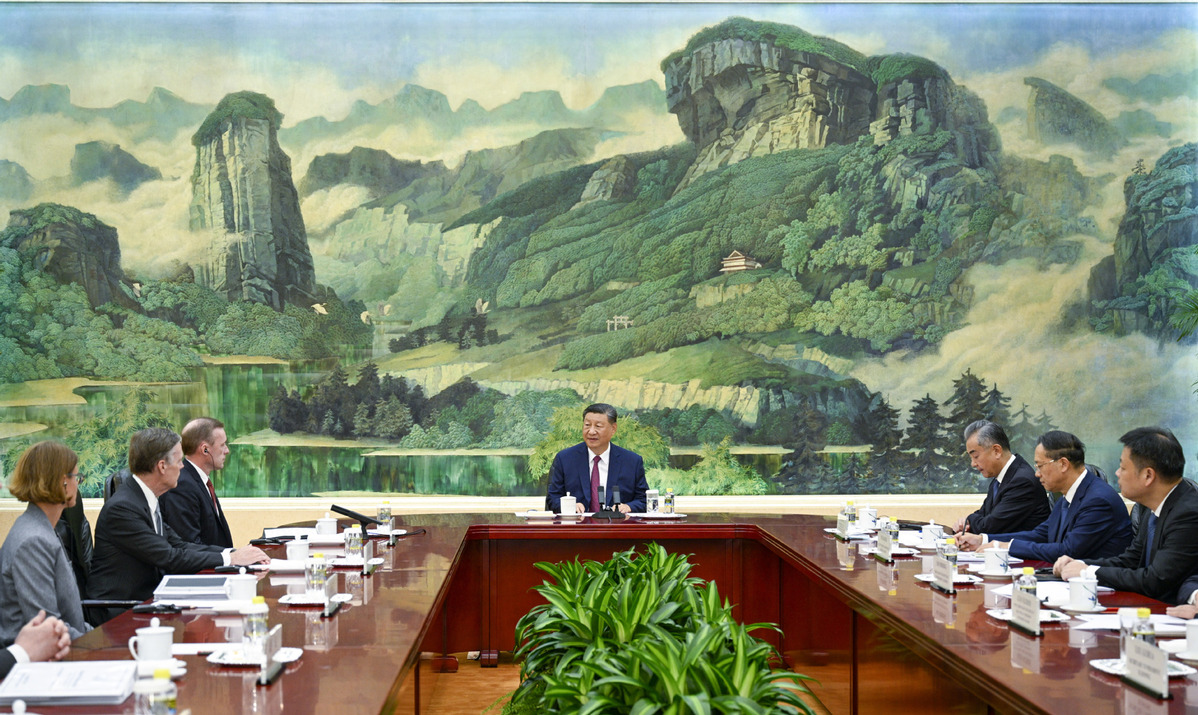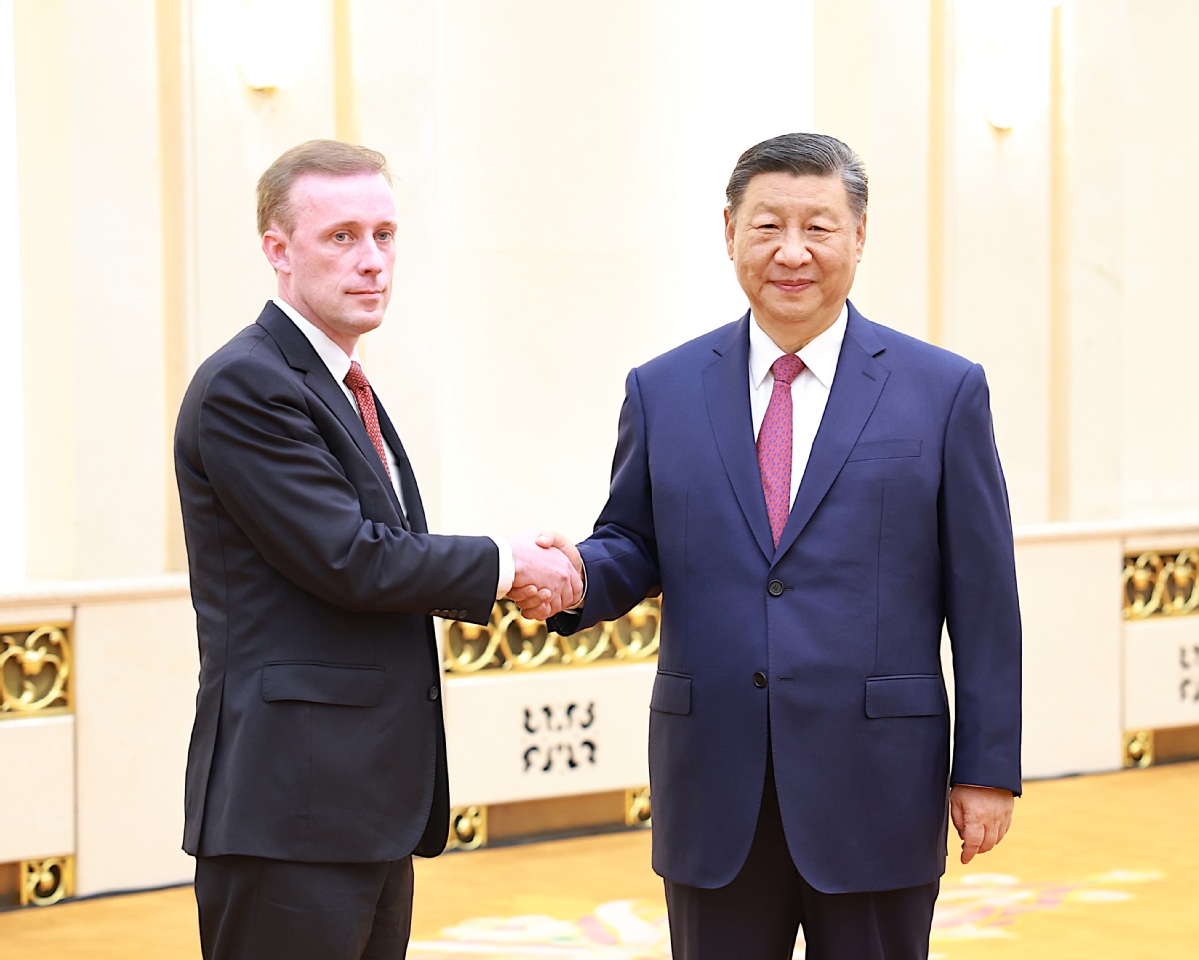Xi urges US to view China properly

When President Xi Jinping met with visiting United States National Security Advisor Jake Sullivan on Thursday afternoon, he highlighted the need for the US to perceive China properly as well as Beijing's foreign policy consistency.
"When China and the US, two major countries, engage with each other, the No 1 issue is to develop a correct strategic perception, and they need to first and foremost find an answer to the overarching question: Are China and the US rivals or partners?" Xi told the senior US official at the Great Hall of the People in Beijing.
Thursday was the final day of Sullivan's three-day visit to China, the first in his current post. Together with Foreign Minister Wang Yi, he co-chaired the two-day China-US strategic communication, which concluded on Wednesday.
Xi said that as two major countries, China and the US should be responsible to history, the people and the world, and "should be a source of stability for world peace and a driving force for common development".
Xi expressed the hope that the US will work in the same direction with China, "view China and its development in a positive and rational light" and "see each other's development as an opportunity rather than a challenge".
He called on Washington to work with Beijing to find a right way for China and the US — two countries with different civilizations, systems and paths — to "coexist in peace and achieve common development on this planet".
The two nations should promote the stability of bilateral ties and, on this basis, strive to improve them and move them forward, he added.
Sullivan conveyed US President Joe Biden's greetings to Xi and thanked Xi for taking the time to meet with him.
He reiterated that Washington does not seek a new Cold War and does not seek to change China's system, and that the revitalization of US alliances is not against China, the US does not support "Taiwan independence", and it does not seek conflict with China.
The US has not changed its one-China policy and has no intention of using the Taiwan question as a tool to contain China, he added.
Analysts noted that Beijing and Washington had candid and adequate discussions and even debate at the recently concluded China-US strategic communication, and its outcomes include further dialogue and collaboration involving areas such as the two militaries, climate change and artificial intelligence.
As part of bilateral cooperation on energy transition and cutting greenhouse gas emissions, US senior adviser for international climate policy John Podesta is set to meet with China's special envoy for climate change Liu Zhenmin during the first week of September.

Pragmatic cooperation
"The US has made some pragmatic gestures, but it still seems obsessed with major-country competition and it keeps containing and suppressing China," said Diao Daming, a professor of US studies at Renmin University of China's School of International Studies.
Beijing's rolling out of pragmatic cooperation with the US while urging Washington to shape a proper perception is part of China's efforts to deal with the US' persistent two-faced approach in its China policy, he said.
On Thursday, Sullivan told Xi that Biden looks forward to having communication again with Xi soon.
Xi asked Sullivan to convey his greetings to Biden, and expressed his willingness to stay in touch with Biden to guide and steer the development of China-US relations.
"Head-of-state diplomacy has been giving an irreplaceable impetus to the relationship and playing a navigating role in stopping the relationship from worsening," said Diao, the professor.
Speaking to Sullivan, Xi said that China's foreign policy is open and transparent and its strategic intentions are aboveboard, both of which "have been highly consistent and stable", and China's US policy "has maintained a high degree of consistency".
While great changes have taken place in the two countries and in China-US relations, China's commitment to the goal of a stable, healthy and sustainable China-US relationship remains unchanged, and the principle of handling the relationship based on mutual respect, peaceful coexistence and win-win cooperation remains unchanged, he said.
What also remains unchanged is China's position of firmly safeguarding the country's sovereignty, security and development interests, as well as its efforts to carry forward the traditional friendship between the Chinese and American peoples, according to Xi.
Sullivan said that since the San Francisco summit last year, the two sides have earnestly implemented the consensus of the two heads of state and made positive progress.
He said his strategic dialogue with Foreign Minister Wang during this visit was in-depth, candid, substantive and constructive.
The US hopes to continue to maintain strategic communication with China to find a way for the US and China to coexist peacefully and for the US-China relationship to develop in a sustainable way, he added.
Responsible management
At a news conference in Beijing on Thursday, Sullivan said the meetings he had during his trip to China were "constructive, candid, substantive", and that he believes it is critical to keep lines of communication open between the US and China.
Competition between the two countries does not have to lead to conflict or confrontation, Sullivan said, adding that "the key is responsible management through diplomacy".
Also on Thursday, Zhang Youxia, vice-chairman of the Central Military Commission, met with Sullivan in Beijing.
Commenting on the situation in the Taiwan Strait, Zhang emphasized that "the Taiwan question is at the core of China's core interests", it constitutes the very foundation of China-US relations, and it is the first and foremost inviolable red line in China-US ties.
China has always been committed to maintaining peace and stability in the Taiwan Strait, but "Taiwan independence" is totally incompatible with peace and stability in the Taiwan Strait, he said.
It is the mission and duty of the People's Liberation Army to resolutely oppose "Taiwan independence" and promote reunification, and the willful provocations of the "Taiwan independence" forces must be countered, he said.
China demands that the US stop military collusion with Taiwan, stop arming Taiwan, and stop spreading false narratives about Taiwan, he said.
Zhang noted that it is in the common interest of both sides and the general expectation of the international community for China and the US to maintain stability in the field of military security.
Washington should return to a rational and pragmatic policy toward China, effectively respect China's core interests, work with China to promote communication and exchanges between the two militaries, and jointly shoulder the responsibilities of major countries, he added.
